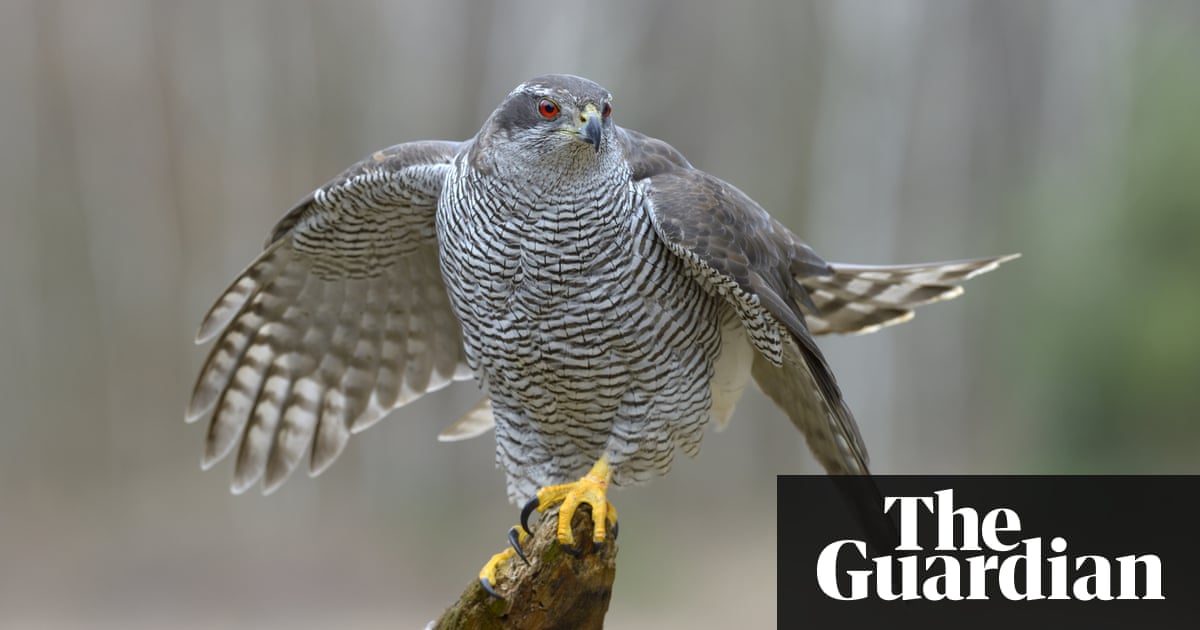
A head keeper employed on one of Scotland’s most illustrious grouse moors, Tillypronie in Royal Deeside, has been banned from controlling birds for three years over an alleged wildlife crime incident.
He worked on an estate owned by Philip Astor, a member of the famous Anglo-American dynasty and vice-chairman of the Game and Wildlife Conservation Trust, an influential campaigning body which advised Astor on his pheasant shoots.
The Guardian has established that the conservation agency Scottish Natural Heritage (SNH) imposed the ban on the head gamekeeper on 15 September last year, after an incident in March 2014 involving a baited trap near a goshawk nest on Astor’s estate. But neither he nor the estate involved were named.
The incident was filmed by a covert camera placed near the nest by the Royal Society for the Protection of Birds as part of a wider investigation into illegal persecution of goshawks across the surrounding area.
Astor sold Tillypronie – a 50 sq km estate near Balmoral which boasts grouse and pheasant shoots, deer stalking, tenant farms, and salmon and trout fishing on the river Don – in various lots last year. It went on the market for offers over £10.5m.
It is the first time SNH has imposed a so-called general licence restriction, which bars a shooting estate or person from controlling wild birds on their land for safety or health reasons, on an individual.
The agency decided to withhold the gamekeeper’s name on data protection grounds, but it confirmed he has been banned from carrying out any wild bird control anywhere in Scotland for three years. Any infringement of the ban could mean prosecution.
The sanction restricts an individual’s ability to work as a gamekeeper. It is understood the man, who no longer works at Tillypronie, was made head keeper in 2012 and was still employed there in 2016.
SNH said: “The aim of these restrictions is to take regulatory action when Police Scotland are unable to prosecute an individual and there is clear evidence that a wildlife crime has been committed, but we use a civil burden of proof.”
The Guardian put this information and SNH’s decision to Astor, who is the cousin of Viscount Astor and a retired barrister, and asked him what action he took after the incident and whether the gamekeeper was suspended or warned about the law. Astor declined to comment.
The Scottish government has some of the strongest legal sanctions against wildlife crime in Europe and is now considering introducing licences for shooting estates, to increase its powers over grouse moors with poor conservation practices.
Alongside prosecuting wildlife offences, the Scottish government has also introduced so-called vicarious liability fines where a landowner can be held responsible if wildlife crimes take place on their land, even if the landowner did not commit the offence.
Astor is married to the writer Justine Picardie, and is related by marriage to Samantha Cameron, wife of the former prime minister David Cameron: Viscount Astor is Samantha Cameron’s stepfather.
Tillypronie boasts direct links to Queen Victoria. Tillypronie House, an 11-bedroom property built in Scots Baronial style, was built by the son of her physician, Sir James Clark. She laid the foundation stone and visited Tillypronie with her companion John Brown.
Astor’s family bought the estate in 1951 and he inherited it in 1984.
The sales brochure said the Game and Wildlife Conservation Trust had advised Astor on how to improve one of Tillypronie’s most famous shoots, “the renowned high bird Towie pheasant shoot”.
Describing Tillypronie as historically one of the most prolific grouse moors in the Highlands, it also quoted Astor saying: “I have worked hard over the past few years to restore the grouse moors to something approaching their former glory, but I feel it is now time for someone else to continue that exercise.
“Meanwhile I am immensely proud to have developed a spectacular pheasant shoot, where discerning teams of guns have been eager to return year after year.”
The incident in March 2014 involving the baited trap was reported to police who investigated but it is understood that prosecutors opted not to take the case to court because of differences in the evidence from key witnesses.
SNH said: “Raptor persecution doesn’t just damage Scotland’s nature, it also affects tourism which, in turn, impacts on the economy. Nature-based tourism is worth £1.4bn a year to Scotland’s economy, but because of the remote locations where most wildlife crime takes place, it’s often difficult to prove.”
The RSPB said its cameras had also monitored incidents of goshawk persecution several weeks after the Tillypronie incident, involving three masked men on another estate nearby. In 2012, similar footage led to the imprisonment of a man who was convicted of killing a goshawk in an illegal trap.
Andrew Gilruth, a spokesman for the Game and Wildlife Conservation Trust, said it “does not condone wildlife crime in any form and strongly supports appropriate action being taken to reduce and prevent it. We provide professional conservation advice to thousands of farmers, gamekeepers and the police in Scotland. Within this, we actively promote compliance with the law and supporting codes of practice.”
from Environment | The Guardian https://ift.tt/2JcaKqR
via IFTTT

No comments:
Post a Comment